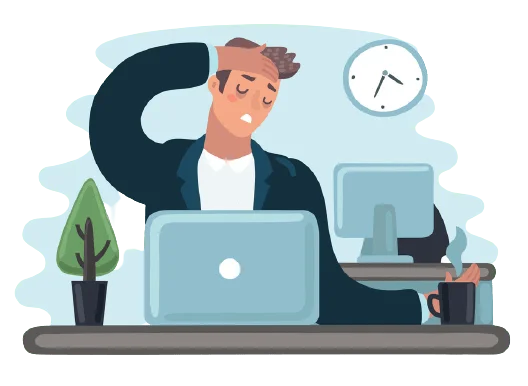Online Stress Therapy | Best Therapist For Stress Help
- Set up a free & confidential chat on your stress issues
- Unlimited help through stress self-care app
- Live Video or Chat sessions with top stress therapists
Begin Therapy
Consult online with best Therapist
Get the best help for Stress
TherapyMantra is here to help you on your path to recovery from stress. We match you with the best stress therapists available 24/7 via video call or messages.
Match with stress Therapists
We assign the best counselors experienced in stress issues based on your needs.
Affordable and Effective
Our online sessions are 90% less expensive than in-person therapy, available 24/7.
Self-Care for stress
We offer ongoing stress support through self-care tools, stress help videos, chat groups, meditations, breathing exercises, and other resources.

Wondering if it’s just a phase or something more? Take our Free online stress test to find out?
How it works?
You are matched with a Stress counselor based on your needs and preferences. You get a secure “therapy room” where you can communicate with your counselor via chat or phone. You can write or talk about Stress & ask questions to deal with stress.

Register for Stress Counseling
Simply complete a 5-minute online form to tell us about your Stress issues

Consult with your Stress Therapist
We connect you with Stress counselors who are available 24/7 based on your preferences and needs.

Connect to Our App
Apart from Video/chat sessions, our app offers self-care tools, videos, and meditations to help you deal with your stress.
Best Stress Therapists
Positive conversations, exercises, and meditations are used by TherapyMantra psychologists to help you deal with stress. Our stress therapists outperform traditional counseling as you get matched from a pool of 500+ stress counselors, who offer 24/7 unrestricted private chat.








What Is Stress?
Stress is the body’s natural response to any demand. It is a natural part of daily life that everyone experiences, sometimes with positive results and other times with negative results. Stress itself isn’t necessarily bad or harmful. It can motivate people to perform at their best under pressure, for example during an exam at school or before making a presentation at work.
There are many definitions of stress, but most would agree that it is a feeling of being overwhelmed or under too much pressure. It can be caused by external factors such as work, relationships, or money problems, or by internal factors such as anxiety or fear.
No matter what the cause, stress can have a negative impact on our health if left unchecked. It is closely linked with both psychological and physical problems, such as low mood, depression, high blood pressure, headaches, heart disease, obesity, diabetes, sleep disorders, and cancer.
Types Of Stress
There are different types of stress, but all have the potential to negatively affect our health.
Acute stress is the most common type and is usually caused by a specific event or situation, such as an unexpected bill or getting into a car accident. This type of stress is usually short-lived and goes away once the triggering event has passed. However, if it’s left untreated, acute stress can lead to chronic stress.
Chronic stress is the type of stress that lasts for a long time and can have a negative impact on our physical and mental health. It’s often caused by long-term factors such as work pressure, money worries, or relationship problems. Chronic stress can lead to a number of health issues and increase the risk of some medical conditions.
Treatment Options For Stress
Some of the most common treatments for stress include:
- Medication: If your doctor determines that you need medication to help you manage your stress, they will likely prescribe you a drug called SSRIs (selective serotonin reuptake inhibitors). These are usually used to treat depression, but they can also help reduce stress.
- Self-help strategies: Some people prefer self-help strategies, such as massage or aromatherapy, to manage their stress.
- Exercise: People often use exercise to manage stress because it releases endorphins, which can reduce the body’s response to stress and promote a sense of well-being.
- Relaxation techniques: Stress management strategies such as yoga, deep breathing, and meditation can help people cope with short-term stress by helping them relax.
- Therapy: Some people may benefit from seeing a therapist to reduce their stress.
- Lifestyle changes: Reducing your caffeine intake, managing your sleep habits, and eating healthier can all help you cope with short-term stress.
How Can Therapy Help With Stress?
Therapy can be a great way to help manage stress. It can provide you with tools and techniques to deal with stress in a healthy way. Therapists can also help you identify the sources of your stress and work on ways to reduce them. If you are struggling with severe or chronic stress, therapy may be a good option for you.
When you visit a therapist, you will learn different techniques to help reduce the release of cortisol in response to stress. Just knowing that you have other options than just tolerating stress can be very helpful. You may also find ways to address the cause of your stress so that it does not continue to affect you.
Therapy can also help improve your mood and increase your self-confidence. When you are feeling good about yourself, it is easier to manage stress.
Therapy Options For Stress
There are many options that provide relief from stress such as
- Cognitive-behavioral therapy (CBT) is a type of psychotherapy that can help you identify and change distorted thoughts and behaviors that contribute to your stress. CBT may be especially helpful if your stress is related to specific situations or problems.
- Mindfulness-based stress reduction (MBSR) is a program that helps you learn mindfulness techniques to become more aware of your thoughts and feelings, and to accept them without judgment. This can help you manage stress more effectively.
- Relaxation techniques such as deep breathing, progressive muscle relaxation, and visualization can help you reduce the physical symptoms of stress.
- Behavioral therapies such as problem-solving therapy and assertiveness training can help you learn new skills to manage stress.
- Psychodynamic therapies, which focus on the relationship between your thoughts, feelings, and behaviors, can help you understand how past experiences may be affecting your current stress level.
- Group therapy can provide support and understanding from others who are also experiencing stress.
- Couples therapy can help couples learn how to better manage stress in their relationship.
How to find a Stress therapist?
TherapyMantra can help you find a stress therapist near you. We have over 500+ therapists listed on our therapist directory. You can follow the following steps to find a good stress therapist:
- First, ask your family doctor or anyone else you are seeing for a referral for a stress therapist.
- The next thing you’ll want to do is ask your friends and loved ones for referrals.
- The next thing you’ll want to do is look online. There are many websites that help people find therapists in their area who can treat things like stress.
10,000+ Happy & Healed Stress patients

“After years of dealing with stress issues, Therapy Mantra assisted me in releasing a lot of buried emotions. I had previously received stress counseling, which helped, but Therapy Mantra was able to turn me around and make me look forward to a better life.”
Kevin,
1 year on TherapyMantra
FAQs
Long-term stressors, such as traumatic events, as well as conditions like anxiety, phobias, and attention deficit hyperactivity disorder, benefit most from behavioral therapy.
Many different sorts of treatment are used by therapists and counselors to help people manage stress in a healthy way. For example, cognitive-behavioral therapy (CBT) is a popular stress treatment option. CBT can aid in the modification of negative cognitive patterns that arise as a result of stress.
This approach may also help with sleep issues if you have trouble falling asleep. When your muscles relax, your body receives the signal that it is safe to sleep. Go for a walk or engage in some other activity. Making time for activities that you enjoy can also help you unwind.
Being under a lot of stress, undergoing significant transformations, concerned about something., having little or no influence over the outcome of a situation, having obligations that are too much for you to handle., insufficient work, activities, or change in one’s life, times of ambiguity.
Stick to the 3-3-3 rule. Begin by taking a look around you and noting three items you notice. Then pay attention. What are the three sounds you hear? Then, using three different areas of your body, such as your fingers, toes, or shoulders, clench and release them.


